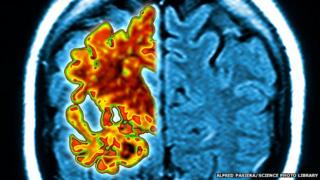
Image copyright
SCIENCE PHOTO LIBRARY
A blood test could spot Alzheimer’s disease at the earliest stage and years before symptoms appear, studies in the US and Sweden suggest.
The test looks for tiny amounts of a protein which is elevated in people with the illness.
Investigators found measuring this protein, p-tau217, could predict Alzheimer’s dementia with 96% accuracy.
Experts say that with more research, it could be developed into a test doctors could offer to patients.
Currently, Alzheimer’s is diagnosed using a combination of memory tests and brain scans, once symptoms have already appeared.
The idea of a dementia blood test is not new, but these two latest studies give the clearest indication yet that a protein associated with Alzheimer’s disease could be used to diagnose people at a much earlier stage.
Early diagnosis is important because it could offer more opportunities to treat the disease.
Dr Rosa Sancho, head of research at Alzheimer’s Research UK, explained that previous clinical trials of drugs had failed because the patients enrolled in them were too far advanced in their illness, and by that time it was “too late”.
She said: “There’s already too much build-up of damaging proteins in their brain.”
Alzheimer’s damages the memory and other cognitive abilities by destroying connections between nerve cells in the brain.
Proteins build up in the brain and cause these cells to die.
In order to establish whether a drug could help hold off the disease, people needed to be identified before they had experienced too much damage to their brain, said Dr Sancho.
While a blood test allowing early diagnosis is unlikely to “make it to the clinic anytime soon,” she said, it will now be available for research purposes.
This means people with a family history of Alzheimer’s who have no symptoms could be identified and enrolled on drug trials.
And this paves the way for them and others to benefit from potential treatments in the future.
A US team at Washington University School of Medicine found looking at p-tau217 in the blood gave as good a picture of a patient’s condition as a brain (PET) scan.
They were able to observe elevated levels of the p-tau217 protein in as little as 4ml of blood.
The team had already shown the protein could be detected in brain and spinal cord fluid of Alzheimer’s patients before they develop symptoms.
Another research team at Lund University in Sweden found people with Alzheimer’s had about seven times as much of p-tau217 as people without Alzheimer’s – and they estimated this could be identified as much as 20 years before they develop symptoms.
They also found looking at this protein allowed them to distinguish Alzheimer’s patients from people with other degenerative brain conditions.
Dr Amanda Heslegrave, a senior research fellow at the UK Dementia Research Institute at University College London, said the findings were great news for research, but added that “while these are exciting results, you could not say that they indicate a definitive test for potential Alzheimer’s disease is available right now”.
Follow Rachel on Twitter

















